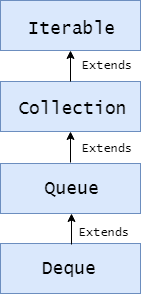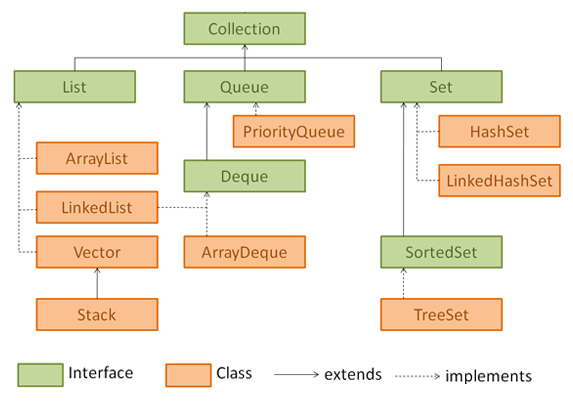Deque interface and ArrayDeque – Java Example
The Deque interface in java is a subtype of Queue interface. A deque is a double-ended-queue, usually pronounced as “deck”. It supports the addition and removal of items from both the ends. It can act like both stacks (LIFO) and queues (FIFO).
We can say deque provides a more versatile data structure than either stack or a queue. However it is not used often compared to stacks and queues in practice.
The hierarchy of deque interface in java is shown below
Deque Interface Java SE 8
The 12 deque methods for insertion, removal and retrieval of Deque elements are listed below
public interface Deque<E> extends Queue<E> {
//Insert operations
void addFirst(E e)
void addLast(E e)
boolean offerFirst(E e);
boolean offerLast(E e);
//Remove operations
E removeFirst();
E removeLast();
E pollFirst();
E pollLast();
//Examine operations
E getFirst();
E getLast();
E peekFirst();
E peekLast();
}
Deque Example
Let’s create deque using linked list and experiment some of the deque methods as shown in example below.
package com.sneppets.java.collections;
import java.util.Deque;
import java.util.LinkedList;
/**
* Program to demonstrate deque interface
* @author sneppets.com
*/
public class DequeInterfaceExample {
public static void main(String[] args)
{
Deque<String> dq = new LinkedList<String>();
//insert operations
System.out.println("Inserting elements..");
dq.addFirst("A");
dq.addLast("Z");
dq.offerFirst("B");
dq.offerLast("Y");
System.out.println("Deque after insert operations : " + dq);
//examine operations
System.out.println("Examining elements...");
System.out.println("getFirst()..." + dq.getFirst());
System.out.println("peekLast()..." + dq.peekLast());
System.out.println("Deque after examine operations : "+ dq);
//remove operations
System.out.println("Removing elements...");
System.out.println("removeFirst()..." + dq.removeFirst());
System.out.println("pollLast()..." +dq.pollLast());
System.out.println("Deque after remove operations : "+ dq);
}
}
Output
Inserting elements.. Deque after insert operations : [B, A, Z, Y] Examining elements... getFirst()...B peekLast()...Y Deque after examine operations : [B, A, Z, Y] Removing elements... removeFirst()...B pollLast()...Y Deque after remove operations : [A, Z]
Deque in Collection Hierarchy
ArrayDeque
ArrayDeque is the resizable-array implementation of the Deque interface. It extends AbstractCollection and implements Deque interface. It does not have any capacity restrictions and they grow the array size as necessary.
They are not thread safe and it does not allow to insert Null elements. ArrayDeque is faster than Stack when used as a stack and faster than Linked List when used as a queue.
Example: ArrayDeque
package com.sneppets.java.collections;
import java.util.ArrayDeque;
/**
* Program to demonstrate ArrayDeque
* @author sneppets.com
*/
public class ArrayDequeExample {
public static void main(String[] args)
{
ArrayDeque<String> aq = new ArrayDeque<String>();
aq.add("A");
aq.add("B");
aq.add("C");
aq.add("D");
System.out.println(aq);
//insert operations
aq.addFirst("X");
aq.addLast("Y");
System.out.println(aq);
//remove operations
aq.removeFirst();
aq.removeLast();
System.out.println(aq);
}
}
Output
[A, B, C, D] [X, A, B, C, D, Y] [A, B, C, D]
Related Posts
- Queue Interface and Example
- Set Interface, Implementations and Examples
- Collection Interface and Examples
- Collection Vs Collections


